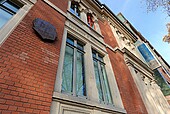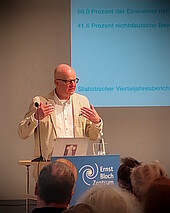Prof. Dr. Kai Vöckler, urban researcher and Professor of Urban Design at the HfG Offenbach, left the large audience at the Ernst Bloch Center last Thursday evening, 8 May, with a thoroughly hopeful feeling. Vöckler's lecture entitled "Perspectives and Challenges of an Arrival City for Germany: The Example of Offenbach am Main" is the latest entry in the joint series "Social Issues", which is held in cooperation with the Ernst Bloch Center and Professors Peter Rahn and Jörg Reitzig from the Ludwigshafen University of Business and Society.
According to Vöckler, the city of Offenbach is doing important integration work for the Rhine-Main metropolitan region. With a non-German population of over 41 percent, Offenbach can be described as the most international city in Germany, but at the same time the unemployment rate is higher than the Hessian average. From an overall perspective for the region, Vöckler sees an unequal distribution of economic benefits and infrastructural tasks between core cities such as Offenbach and the surrounding areas. Vöckler also sees the fact that the growing non-German proportion of high school graduates is not reflected in the city administration and politics as a problem. Established migrant networks and support structures, which are often the first points of contact for newcomers, also remain a challenge for the work of the city administration.
According to Vöckler, the city of Offenbach, which recognized the relevance of the topic of integration very early on, is an ideal example of an "arrival city", as described by the British-Canadian author Doug Saunders in his book on migration movements published in 2011: Offenbach is thus considered an arrival city and stopover, which the majority of arrivals leave again as soon as they have achieved social advancement. According to Vöckler, this raises key questions of identity for the city that need to be addressed openly. Cultural appropriation practices play a major role in creating a sense of community. The urban researcher presented a number of examples, such as the music of rapper Haftbefehl and projects from the university sector that make residents and local businesses visible and portray them. Vöckler cited the city's participation in the Venice Architecture Biennale in 2016 as a key moment of success for strengthening the urban self-image, where the city was part of the exhibition "Making Heimat. Arrival Country Germany".
After the lecture, there were comments from the audience and a lively discussion, for example with regard to the parallels with Ludwigshafen. When asked about gentrification tendencies, Vöckler recommended a cautious use of the term, as gentrification processes are definitely in line with general urban development. It is much more important to focus on fundamental problems, such as the general lack of affordable housing. In view of current democratic crises, Vöckler also emphasized once again towards the end the task of city administrations and civil society to develop ways to identify with the community.
Johannes Alvarez, Ernst Bloch Center


